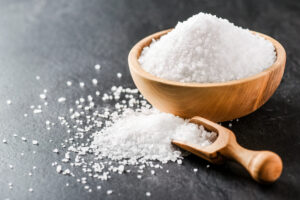
Research shows that table salt could improve plastic recycling
Canadian Plastics
Materials Recycling Research & DevelopmentTable salt can outperform much more expensive materials being explored to help recycle plastics, researchers at Michigan State University say.

Photo Credit: Adobe Stock/Milan
Researchers at Michigan State University (MSU) have showed that sodium chloride – best known as table salt – can much more expensive materials being explored to help recycle plastics.
Although plastics have historically been marketed as recyclable, the reality is that nearly 90 per cent of plastic waste in the U.S. alone ends up in landfills, in incinerators or as pollution in the environment – and one reason why is that the materials recovered from recycling aren’t valuable enough to spend the money and resources required to get them.
But table salt could flip the economics and drastically reduce costs when it comes to a recycling process known as pyrolysis, which uses heat and chemistry to break down the plastics into a mixture of simpler, carbon-based compounds, which come out in three forms: gas, liquid oil, and solid wax. That wax component is often undesirable, yet it can account for more than half of products, by weight, of current pyrolysis methods. That’s even when using catalysts, which are helpful, but they often can be toxic or prohibitively expensive to be applied in managing waste plastics. “Catalysts are helpful, but can often be toxic or too expensive to use in managing waste plastics,” said Muhammad Rabnawaz, an MSU professor and the leader of the research team. “No company in the world has that kind of cash to burn.”
Rabnawaz describes his findings in a recent paper, “Revolutionizing Plastics Chemical Recycling with Table Salt,” which shows that table salt alone can eliminate the wax byproduct.
The major byproduct that the team produced while using table salt in pyrolysis was liquid oil that contains hydrocarbon molecules similar to what’s in diesel fuel.
Researchers also demonstrated how the salt catalyst is reusable. “You can recover salt by simply washing the obtained oil with water,” Rabnawaz said.
Based on a preliminary analysis, his team has estimated that a commercial pyrolysis reactor could triple its profits, just by adding salt–thereby, potentially solving the economic barrier to recycling more plastics.
The MSU team is continuing to further its pyrolysis project – for instance, they have yet to fully characterize the gas products of pyrolysis with table salt. And Rabnawaz believes the team can improve this approach so that the liquid products contain chemicals with more valuable applications than being burned as fuel.
Still, the early returns of the team’s new table salt tactics are encouraging. Based on a preliminary economic analysis supported by the U.S. Department of Agriculture and MSU AgBioResearch, the team estimated a commercial pyrolysis reactor could triple its profits just by adding salt.
